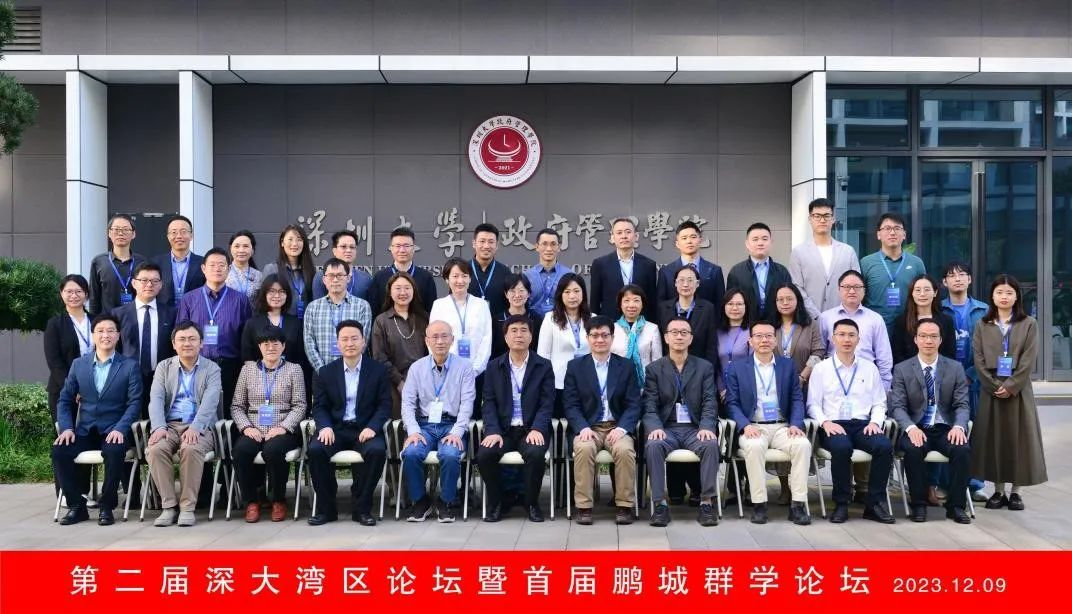On December 9, the Second SZU Bay Area Forum and the First "Pengcheng Academic" Forum, hosted by Shenzhen University and jointly organized by the Social Science Department and the School of Government, took place at Shenzhen University's Lihu Campus. The theme of this forum was "Chinese Modernization and High-Quality Social Development in the Greater Bay Area." Over 50 scholars and editors from various institutions including Tsinghua University, Peking University, Nanjing University, Fudan University, Sun Yat-sen University, Nankai University, Wuhan University, Xiamen University, East China Normal University, Southeast University, Xi'an Jiaotong University, East China University of Political Science and Law, Southwestern University of Finance and Economics, Guangzhou University, Shenzhen Technology University, Guangdong Academy of Social Sciences, Shenzhen Academy of Social Sciences, the Chinese University of Hong Kong, Hong Kong University of Science and Technology, Macau University of Science and Technology, as well as academic journals such as Sociology Research, Academic Monthly, Nankai Journal, Shandong University Journal, Social Science Journal, Shenzhen University Journal, and Youth Exploration, gathered to discuss high-quality social development in the Greater Bay Area.
The opening ceremony was hosted by Professor Gu Zhijun, Vice Dean of the School of Government. Wang Yongcheng, a member of the Standing Committee of the Party Committee and Vice President of Shenzhen University, and Huang Binhui, Vice Dean of the School of Government, welcomed the attendees and expressed their hopes for the first "Pengcheng Academic" Forum to spark intellectual exchanges. Zeng Xianju, Director of the Social Science Department, attended the opening ceremony.
The main forum featured two keynote sessions. The first session, hosted by Professor Zhou Lingang, Executive Director of the Center for the Development of Disabled Persons in the Pilot Demonstration Area of Socialism with Chinese Characteristics and a professor at the School of Government, included presentations from Cai He, former Dean of the School of Sociology and Anthropology at Sun Yat-sen University; Wang Tianfu, Vice Dean of the School of Social Sciences at Tsinghua University; Cheng Boqing, Dean of the School of Sociology at Nanjing University; and Wen Jun, Dean of the School of Social Development at East China Normal University. The four scholars shared their latest research on topics such as platform economy, risk society, and public trust.
Cai He presented "The Impact of Platform Economy on Social Structure," using a Marxist analytical approach to introduce the concept of the "middle class," the main characteristics of the platform economy, and the rebirth of the "middle class" within the platform economy. He concluded that small-scale producers, represented by self-employed individuals, have become an indispensable force in economic and social development in the new economic model. Cai called on academia to return to a Marxist analytical stance, emphasizing the qualitative impact of the digital technology revolution on social change and exploring the contemporary analytical value of the middle class concept.
Wang Tianfu's keynote, "Historic Opportunities and Imagination for the Development of Sociology with Chinese Characteristics," traced the evolution of thoughts and theories in social change, pointing out the fundamental transformations brought by the digital age to social production and life. He argued for the importance of seizing the opportunities in digital society research through exchange and communication to further develop social theories.
Cheng Boqing discussed "Values and Modernization from a Sociological Perspective," addressing Parsons' treatment of values, the measurement of values in sociology, and the profound implications of modern values. He concluded with a call to construct diverse dialogues, transcend the "clash of civilizations," and build a community with a shared future for mankind based on common human values.
Wen Jun delivered a keynote on "Public Trust Risks and Responses in Uncertain Urban Contexts," highlighting that urban trust risks in uncertain times stem from objective external factors, subjective internal factors, and situational perceptions. He noted that public trust risks exhibit an "endogenization" feature at both individual and group levels. Wen proposed governance paths such as promoting public participation, rebuilding expert system trust, and strengthening the public credit system.
The second keynote session was hosted by Professor Chi Shangxin, Head of the Sociology Department at the School of Government. Scholars from Xiamen University, Sun Yat-sen University, and Fudan University shared their insights.
Xu Yanhui, Vice Dean of the School of Sociology and Anthropology at Xiamen University, presented research on "Social Quality and the Sense of Gain Among Shenzhen Residents." The study indicated that the sense of gain among Shenzhen residents is at a moderate level, with significant differences among various dimensions. Ecological gain ranked highest, followed by cultural, livelihood, and political gains, with economic gain being the lowest.
Liang Yucheng, Vice Dean of the School of Sociology and Anthropology at Sun Yat-sen University, gave a keynote on "Social Differentiation in the Intelligent Age." Based on studies of labor market changes, social differentiation in intelligent societies, and changes in social cognitive structures, Liang's team found that the substitution rate of AI for middle-class jobs is relatively high. While not causing massive unemployment, this drives a significant portion of the workforce into sectors like manufacturing and modern services. They also noted that as GPTs become tools for obtaining professional insights, social decentralization and fragmentation intensify, necessitating diversity to restore social integration.
Hu Anning, Vice Dean of the Graduate School and professor at the School of Social Development and Public Policy at Fudan University, discussed "Family and Nation in Differential Order: A Sociological Analysis of the Family-Nation Structure." He emphasized that to study the "living" traditional culture in real life, traditional cultural concepts must be grounded in empirical research. Understanding the complex, multidimensional concept of family-nation structure from various angles can lead to different conclusions about its role and function in contemporary society.
In the afternoon, three parallel forums were held on topics such as social development in the Greater Bay Area, healthcare and health, digital society, organization and governance, and employment and income. Scholars engaged in focused discussions on current issues such as the development of the Guangdong-Hong Kong-Macao Greater Bay Area, trust in healthcare, organizational construction, and youth employment.

Editor: Chen Yihan
First Reviewer: Zhang Jiajing
Second Reviewer: Chi Shangxin
Final Reviewer: Gu Zhijun

